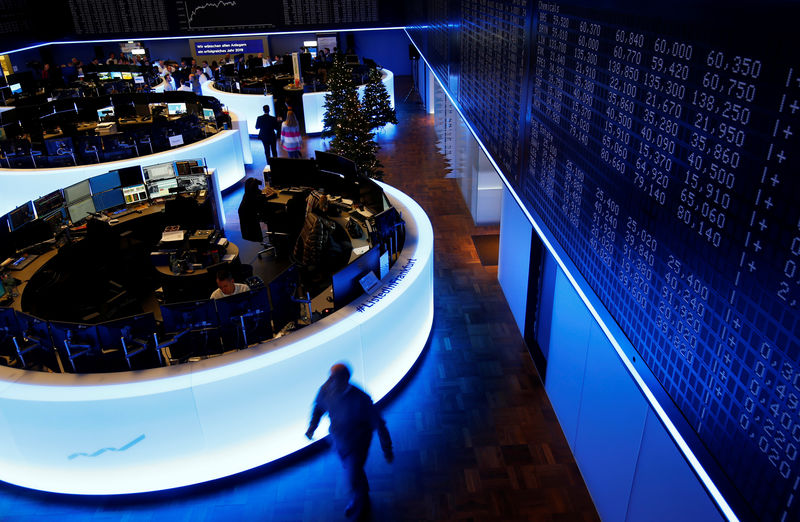This post was originally published on this site
https://i-invdn-com.akamaized.net/news/LYNXNPEF030BG_M.jpg © Reuters.
© Reuters.By Peter Nurse
Investing.com – European stock markets are set for losses Thursday, along with the oil complex, while both gold and government bonds are in demand in a classic risk off move. This comes amid growing signs the efforts to contain the spread of the deadly coronavirus in China are having a significant impact on growth.
At 02:10 ET (0710 GMT), the contract traded 105 points, or 0.8% lower. France’s were down 43 points, or 0.7%, while the contract in the U.K. fell 49 points, or 0.7%. Futures on the pan-eurozone index, the , dropped 28 points, or 0.8%.
Additionally, futures traded 1.2% lower at $52.68 and the international benchmark contract fell 1.3% to $58.17. for February delivery on New York’s COMEX were 0.6% higher at $1,579.75.
The yield on the benchmark U.S. Treasury fell 3 basis points to a low of 1.56%, approaching levels not seen since October last year.
Overnight China’s National Health Commission said the total number of confirmed deaths had reached 170 as of late Wednesday, with the number of infected patients approaching 8,000. Infections have been reported in at least 15 other countries and in every province of mainland China.
A large number of companies have suspended their China operations for the time being as part of the effort to contain the disease, while domestic and international airlines have cancelled flights.
All of these efforts are likely to have a significant negative shock on growth in the second largest economy in the world, something Federal Reserve Chairman Jerome Powell acknowledged during his press conference late Wednesday. He added it was too early to assess its impact on the U.S. The central bank decided to keep its interest rates on hold.
J.P. Morgan economists on Thursday said these events could knock China’s growth in this quarter from a previously-forecast 6.3% to 4.9%, for a year-on-year figure of 5.6%.
“The SARS episode in 2003 suggests that the shock could lead to a large impact on economic activity, especially as the fear factor could restrict people’s mobility,” J.P. Morgan analysts wrote.
SARS is believed to have knocked at least 1.0% off Chinese gross domestic product back in 2003, said ING analysts, in a research note.
“In economic terms, however, the global economy has become more integrated and intertwined since 2003,” they added. “Consequently, the speed of the virus spreading could be faster than in 2003, while at the same time the negative impact on global growth could also be higher than in 2003.”
Turning back to Europe, the earnings season continues with heavyweight companies of the likes of Unilever (LON:), Diageo (LON:) and Shell (LON:) reporting fourth quarter figures.
Eyes will also be on the , with an announcement from its rate-setting Monetary Policy Committee due at 07:00 AM ET (1200 GMT). There is a degree of uncertainty surrounding this meeting. A series of dovish comments by MPC members had stoked up expectations of a rate cut, but the economic data which have followed have generally been positive.
Additional economic data due Thursday include and Swiss leading indicators, EU consumer confidence and U.K. money supply.

